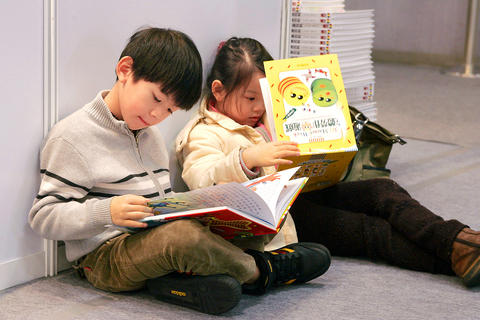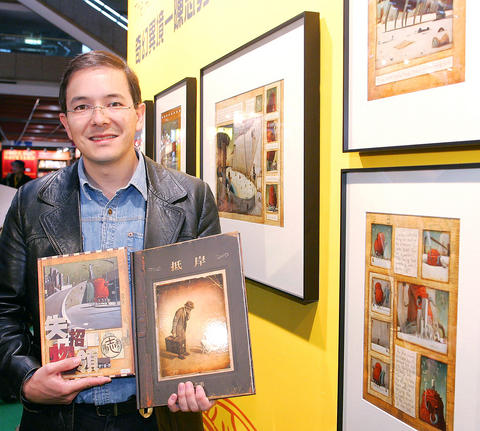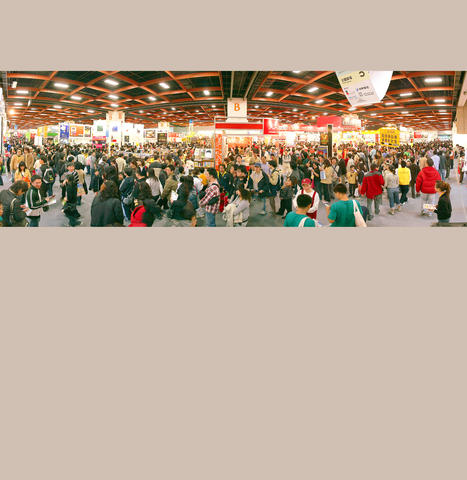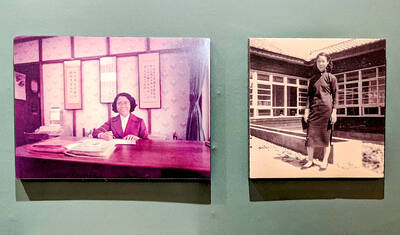Billed as one of Asia's biggest book fairs, the 16th Taipei International Book Exhibition (TIBE, 第十六屆台北國際書展) opens its doors to the public today. Activities in Exhibition Hall One were restricted to industry professionals yesterday.
While many of the participants will have a serious purpose for attending the event - it's a major forum for copyright negotiations - there's plenty to enjoy for the average reader. The country in focus this year is Australia, which will be showing off its multicultural and youthful outlook on the world. The dominating presence of Tony and Maureen Wheeler, the founders of the Lonely Planet series, segues the focus on Australia into another theme, also multicultural and youthful: travel.
Given the heavy intellectual atmosphere of last year's Russian national theme, this year's fair is certainly more accessible, though, as Australians are quick to point out, they are hardly lightweights in the intellectual literary stakes. (Oz boasts only one Nobel Laureate in literature in the shape of Patrick White, but Peter Carey and JM Coetzee - a naturalized Australian - are among those tipped for the future recipients of the accolade). Be that as it may, the mood of the Australian presence is young and international, with design accorded as much importance as the written word.

One of the stars of the Australian delegation is Shaun Tan (陳志勇), whose graphic novels have won numerous awards. A display of manuscript drawings of his work is on display in the Australian Pavilion.
The Travel Literature Pavilion is a first for the TIBE. Combining travel with literature, the pavilion takes traveling to a new level through exhibits such as the Click! Taiwan gallery and the Box Fun on Traveling art installation created with contributions from TIBE spokesman A-hsin (阿信), vocalist for the band Mayday (五月天), as well as over 20 local Taiwanese authors and travel writers.
Exciting illustrations and photographs from the Etonnants Voyageurs Festival, which is dedicated to travel literature and held each year in Saint-Malo, a resort town in northern France, adds to the mood of wanderlust. Michel Le Bris, the festival's founder, and Gilles Lapouge, travel writer and producer of the well-known French TV reading program Apostrophes, share their travel tales at the fair.

For those who want to judge a book by its cover, there's no better place to visit than the Most Beautiful Book Design Pavilion, which features winners from the Best Book Design from All Over the World award offered by the Stiftung Buchkunst (Book Art Foundation) in Germany. It also features the works of Japanese book designer Sugiura Kohei, acclaimed as the "Giant of Japanese Design," works selected for the Best of Asian Design by Lu Jingren (呂敬人), and winners of the Golden Butterfly Award - Taiwan's top book design prize. You don't even need to look inside; which is fortunate, for in most cases you can't.
Linden Lin (林載爵), chairman of the Taiwan Book Fair Foundation, was quick to point out that the book exhibition's activities extend beyond the limits of the Taipei World Trade Center (TWTC) exhibition halls. Now in its fourth year, the Reading Festival promotes reading in schools. This includes the Reading Learning Handbook program, which is organized in conjunction with Taipei Municipal libraries and produces reading guides that encourage students to access libraries and TIBE resources.
Last year, the TIBE organized a Reading Train that took students from remote parts of Ilan directly to Taipei for the exhibition. Today, the train will transport over 200 students from remote regions and Aboriginal communities in Hsinchu County to the TIBE.

"There really isn't much point if the activity is only restricted to Taipei residents," Lin said at a press conference held to launch TIBE.
The Anime & Comics Pavilion and the Fantasy Pavilion are also aimed at bringing children back into the world of books through the presence of artists and a chance to enjoy the Computer Graphics Experience Zone.
Event information:
TIBE 2008 will be taking over all three exhibition halls of the TWTC until Monday.
Opening hours: 10am to 6pm, extended to 10pm on Friday and Saturday and 8pm on Sunday
Tickets: NT$100 for adults, NT$80 concessions. An event pass valid for the whole six days is NT$180 for adults, NT$150 concessions
On the Net: Detailed schedules of daily events can be found at TIBE's Web site at www.tibe.org.tw/2008/

Following the shock complete failure of all the recall votes against Chinese Nationalist Party (KMT) lawmakers on July 26, pan-blue supporters and the Chinese Communist Party (CCP) were giddy with victory. A notable exception was KMT Chairman Eric Chu (朱立倫), who knew better. At a press conference on July 29, he bowed deeply in gratitude to the voters and said the recalls were “not about which party won or lost, but were a great victory for the Taiwanese voters.” The entire recall process was a disaster for both the KMT and the Democratic Progressive Party (DPP). The only bright spot for

Water management is one of the most powerful forces shaping modern Taiwan’s landscapes and politics. Many of Taiwan’s township and county boundaries are defined by watersheds. The current course of the mighty Jhuoshuei River (濁水溪) was largely established by Japanese embankment building during the 1918-1923 period. Taoyuan is dotted with ponds constructed by settlers from China during the Qing period. Countless local civic actions have been driven by opposition to water projects. Last week something like 2,600mm of rain fell on southern Taiwan in seven days, peaking at over 2,800mm in Duona (多納) in Kaohsiung’s Maolin District (茂林), according to

Aug. 11 to Aug. 17 Those who never heard of architect Hsiu Tse-lan (修澤蘭) must have seen her work — on the reverse of the NT$100 bill is the Yangmingshan Zhongshan Hall (陽明山中山樓). Then-president Chiang Kai-shek (蔣介石) reportedly hand-picked her for the job and gave her just 13 months to complete it in time for the centennial of Republic of China founder Sun Yat-sen’s birth on Nov. 12, 1966. Another landmark project is Garden City (花園新城) in New Taipei City’s Sindian District (新店) — Taiwan’s first mountainside planned community, which Hsiu initiated in 1968. She was involved in every stage, from selecting

As last month dawned, the Democratic Progressive Party (DPP) was in a good position. The recall campaigns had strong momentum, polling showed many Chinese Nationalist Party (KMT) lawmakers at risk of recall and even the KMT was bracing for losing seats while facing a tsunami of voter fraud investigations. Polling pointed to some of the recalls being a lock for victory. Though in most districts the majority was against recalling their lawmaker, among voters “definitely” planning to vote, there were double-digit margins in favor of recall in at least five districts, with three districts near or above 20 percent in